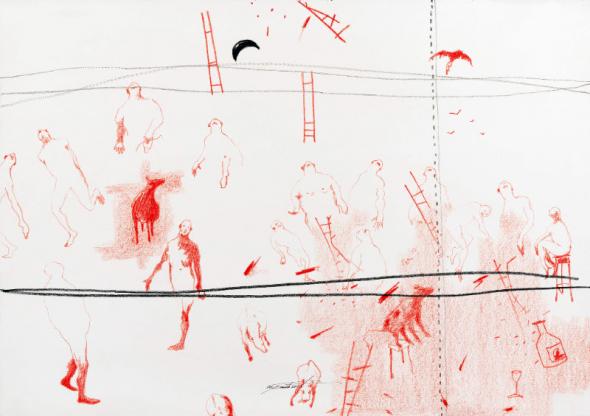Forgetting in portuguese
We can understand a society both by what it treasures in its collective memory, and by what it forgets. It is a fact: societies forget. Forgetting is a necessary process for creating collective identities, political solidarities and projects of social governance. It plays a role, too, in survival and rebeginning after civil wars or other crises in which societies break down. The notion of forgetfulness as a useful and integral tool of social and political construction has been addressed by several well-known authors, from the French writer Paul Ricoeur to the British Paul Connerton and the American David Rieff.
 black moon| 2018 | Nú Barreto
black moon| 2018 | Nú Barreto
The Encyclopaedia Britannica offers a clear definition of forgetting: “when the memory of a past event is not activated for days or months, forgetting tends to occur.” This definition stresses the active capacity of the term; the production of the process of forgetting. Transposing this definition to the social realm, what exactly is it that collective memories fail to activate for months, years or centuries, eventually leading to “forgetting”? And what does this forgetting produce? Forgetting does not produce blank space. The referent of the experience that is not activated and that is eventually forgotten does not disappear. It is this productivity of forgetting that concerns and stimulates my work on memor(ies).
For some years now, debates and public discussions have taken place in Portugal about the country’s historical narrative. The announcement of a museum in Lisbon dedicated to the ‘Discoveries’ further charged this debate. To me, the forgetting implicit in all this engages very clearly with the interviews that the MEMOIRS project has been conducting with descendants of families who came from Angola. These interviews underpin my case study. One aspect of this forgetting involves the teaching of history. In the experience and memory of the people we interviewed, the school continues to forget the complexity of the Portuguese colonial experience and its European context, particularly in the phase following that the ‘Discoveries.’ Those are taught thoroughly before fading away from a succinctly taught and disparate history that ends abruptly with the 25 of April of 1974.
In the debate about the new museum, the narrative of the country’s contribution to the beginning of European modernity continues to obscure the violence of that project. This violence is visible both in the establishment of commerce (with the opening, among other routes, of the transatlantic slave trade which trafficked people on an unprecedented scale). There was violence too in the imposition of European imperialism that led to the “wars of pacification” in Africa and Asia, an oxymoron that encloses in itself the inevitable violence of this historical period. Forgetting is applied too to the politically and socially organized violence involved in the economic exploitation of material resources and people from the “discovered” territories, and the violent struggles for liberation from the yoke of colonialism in the 20th century. See, for example, the texts that have been published in the Jornal de Letras (between May and July), as well as the arguments of the panel enthusiastically in favour of the museum that participated in the popular programme Pros and Cons on 16 July 2018. There, these documented and acknowledged violences were relegated to a footnote and justified with the claim that ‘it was common at the time.’ Forgetting, then, was explicitly defended.
This is a political debate, there are alternatives. No historiographical narrative is neutral; “what is at stake is not simply what we were, but, rather, what we are and, above all, what we want to be” (A. Sousa Ribeiro). Moreover, neutrality is impossible when we discuss the construction of a museum that would be “an instrument of power” (A. Pinto Ribeiro). Portugal is, as never before, in a moment of informed and fertile debate, extended to the entire white and non-white Portuguese community, in conjunction with similar debates in Europe (See F. Cammaert on Brussels, F. Vilar on France; A. Sousa Ribeiro on Berlin) and beyond (See R. Vecchi on Argentina, A. Tironi on Chile , or M.C. Ribeiro on the French West Indies). Now, in this social and political context of Portugal and Europe, we must ask what is produced by this forgetting that is the result of the teaching of history, the monumentalization of the so-called ‘Discoveries’ in Lisbon and other Portuguese cities and media events like the debate I have mentioned.
At the initiative of the Association of Afrodescendants (DJASS) the project of a memorial to slavery was approved through Lisbon’s 2017/8 Participatory Budget. In the context of the ‘Museum of the Discoveries’ announcement, which emerged after the current executive’s manifesto, the DJASS initiative has gained relevance through the “duty of memory” (Levi) that it represents. It can play a role in counteracting the forgetting - once again - of the less ephemeral aspects of the “journeys.” The same municipality now finds itself involved in two projects that could speak to each other. Up to now, however, it is not clear how they might fit together. We are eager to see how these multidirectional memories (Rothberg) will connect, or whether, on the contrary, they will continue to be in conflict (Stora, Blanchard): this is the danger of the single story (Chimamanda Adichie).
Article produced for project MEMOIRS – Children of Empire and European Postmemories, funded by the European Research Council (ERC) under the European Union’s Horizon 2020 research and innovation programme (grant agreement No 648624).